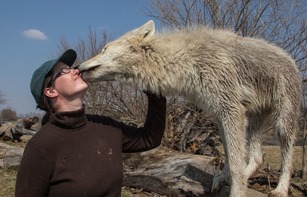As a child, I liked books and languages. I thought I would end up a literature professor. In college, I studied weird languages like Middle Welsh. I concentrated in medieval studies, which, it turned out, was about writing, writing, and more writing.
As a young adult, I decided that medievalists just rehash the past and I wanted to make new things. After graduating in 1995, I learned to program and got a job in online publishing. I helped build systems that converted documents from one format to another so that people could read them on computers. I enjoyed the computer boom of the 1990s.
After the dot com bubble burst in 1999, the world of programming was less fun. I started to get bored. I learned tai chi and then started to teach it. But eventually that wasn't holding me, either.
In 2003 I adopted my first dog, Jack, and got into the world of dog rescue, where I discovered dog training and dog behavior and delicious dog brains. It wasn't really clear how to learn everything I wanted to about dog brains, but I was told that PhDs don't study dogs, vets do. So I took all the basic science classes that I had avoided as a medievalist, and started veterinary school in 2007. Hedging my bets about the whole PhD research versus veterinary clinical practice thing, though, I enrolled in a five year program to get both DVM and MS degrees, with a year spent doing research, to see if that was up my alley. My Master's research was on stress in hospitalized dogs: how stressful is hospitalization for dogs? And can we pick out the more stressed dogs just by watching their behavior?
While I was in veterinary school I figured out that while I'm not a huge fan of the practice of medicine in general, I am a huge fan of the practice of population medicine. Vets practice population medicine on cows and shelter animals, and while I do really like cows, my heart is with shelter medicine, and that's where I ended up. After veterinary school I did a shelter medicine specialty internship, an immersive clinical year learning about how to help shelters take better care of their animals.
Since research was indeed right up my alley, after my internship I entered a PhD program, studying the genomics of fox behavior with Kukekova Lab at the University of Illinois at Urbana-Champaign. After graduation, I joined Karlsson Lab at the Broad Institute of MIT and Harvard, where I worked with the genomics of behavior in pet dogs. Here I finally got to use almost all my accumulated skills: programming in bioinformatics, doing research on canine behavior, and scratching the writing itch with stories for the lab's blog and for magazines. (I haven't found a use for the Middle Welsh yet, but you never know.)
In 2020 I founded the Functional Dog Collaborative (FDC), a non-profit that is working to change the culture around dog breeding. In 2021 I started teaching Behavioral Biology for the Virginia Tech online Master's program in Applied Animal Behavior and Welfare. In 2022 I left the Broad to focus on the FDC. It is little but it is mighty!



